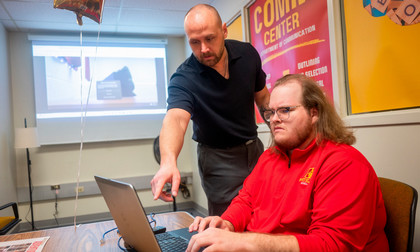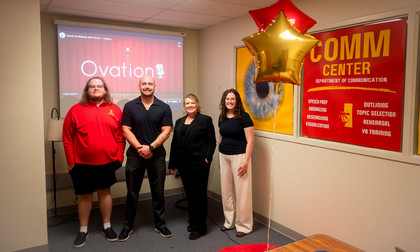Professor Alicia Mason, who oversees a team of graduate teaching assistants responsible for about 550 students in speech classes each year, understands the apprehension many students face when it comes to speaking in front of others: Mason herself does not enjoy it at all.
“Speaking in front of people can be a bit gut-wrenching for me,” said Mason (MA ‘06). “I recognize those needs in students.”
State guidelines require students to complete at least three speeches in a live setting. Up to 25 percent of students report high levels of communication apprehension, which can manifest in no-shows on speech day — an avoidance strategy.
Surveys showed they were experiencing extreme anxiety at even the thought of speaking in front of groups of people.
Adding tools and resources to the existing Communication Center was the answer. A grant Mason wrote will provide funding for two years.
“We only have them here for so long, so let’s make a difference that will pay off long-term for them,” she said. “It’s not just about them getting a grade in a speech class. They will use these abilities the rest of their lives.”
“For people who are terrified, this is a form of exposure therapy,” Mason explained.

Furthering the use of OvationVR this fall in interpersonal communication scenarios such as a first date, a job interview, or with a co-worker, and an online scheduling system for making appointments.
“It will allow people to practice skills that are difficult to navigate, and it can be lifechanging,” Mason said. “This is designed to help people overcome barriers.”

The Communication Center, previously located in Axe Library, recently relocated to the second floor of Grubbs Hall, home to the Communication Department. This provides a closer proximity to faculty, staff, and graduate teaching assistants.
It is open to all PSU students, regardless of major or whether they are enrolled in a speech class.
Pitt State Communication Center